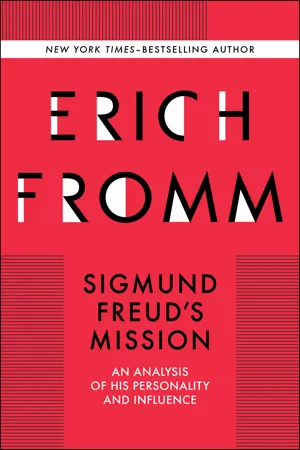![]()
Notes
1 The same point has been made by Helen Walker Puner in her excellent biography Freud, His Life and His Mind, Grosset and Dunlap, New York, 1943 (to be republished as a Dell-book in 1959). Her book is a most penetrating biography of Freud; in a number of important points, especially those of Freud’s attitude to his Jewish background and of the quasi-religious character of the movement, my conclusions are very similar to the ones arrived at by her.
A profound analysis of Freud’s relationship to his Jewish background is to be found in Ernst Simon’s study, “Sigmund Freud, the Jew” (in Yearbook II of the publications of the Leo Baeck Institute, London, 1957, pp. 270 ff.). I am also indebted to Professor Simon for reading the manuscript of this book, and for a number of critical suggestions.
2 Ernest Jones, The Life and Work of Sigmund Freud (New York, Basic Books, Inc.), Vol. 2, p. 433.
3 Sigmund Freud, The Interpretation of Dreams, translated by James Strachey, Basic Books, Inc., New York, 1955, p. 204.
4 Jones, op. cit., Vol. II, p. 409.
5 It is a characteristic example of the idolizing and unanalytic approach of Jones’s biography that he comments that this incident is “an illustration of the esteem in which he and his studies were held in the family.” This is, of course, a way of putting it—the conventional, common-sense way, rather than the analytic, dynamic one.
6 S. Freud, Collected Works, Hogarth Press. London, 1952, Vol. IV, p. 367.
7 Cf. E. Simon, op. cit., p. 272.
8 Jones, op. cit., Vol. I, p. 5.
9 It is interesting to note that Freud’s great predecessor in the discovery of the power of the attachment to the mother, J. J. Bachofen, was also deeply attached to his mother. (He married when he was around forty, after his mother’s death.) He did not, however, try to minimize the power of this emotional attachment but, on the contrary, revealed its significance in his theory of the matriarchate.
10 Cf. The Origins of Psychoanalysis, letters to Wilhelm Fliess, by Sigmund Freud, Basic Books, Inc., New York, 1954, p. 305.
11 Ibid., p. 318. (My italics. E. F.)
12 Quoted from Jones, op. cit., Vol. II, pp. 69-70.
13 Quoted from Jones, op. cit., Vol. I, p. 84.
14 Letter to Martha (November 5, 1883), quoted by Jones, op. cit., Vol. I, p. 177.
15 Cf. Jones, op. cit., Vol. II, p. 421.
16 J. Worthis, Fragment of an Analysis with Freud, Simon and Schuster, New York, 1954, p. 98. (Italics mine. E. F.)
17 Letter of September 15, 1910, quoted by E. Jones, op. cit., Vol. II, p. 394.
18 Jones, op. cit., Vol. II, p. 386.
19 The Origins of Psychoanalysis, ed. by M. Bonaparte, A. Freud, E. Kris, Basic Books, Inc., New York, 1954, p. 227; letter to Fliess, 31. 10. 97.
20 S. Freud, Civilization and Its Discontents, translated by J. Riviere, The Hogarth Press, Ltd., London, 1953, p. 76.
21 “Civilized Sexual Morality and Modern Nervousness,” Collected Papers, II, 89.
22 To M. Bonaparte, as quoted by Jones, op. cit., Vol. II, p. 421.
23 Sigmund Freud, Civilization and Its Discontents, pp. 81-82.
24 Letter to his fiancée of August 29, 1883, quoted by Jones, op. cit., Vol. I, pp. 190-92. (Italics mine. E. F.)
25 The Origin of Psychoanalysis, p. 307. (My italics. E. F.)
26 Jones, op. cit., Vol. I, pp. 254-55.
27 The letter mentioned here is not published in the volume of Freud’s letters to Fliess (The Origins of Psychoanalysis).
28 Jones, op. cit., Vol. I, p. 255.
29 The Origins of Psychoanalysis, p. 272.
30 Jones, op. cit., Vol. I, p. 314.
31 The Origins of Psychoanalysis, pp. 334-35.
32 Jones, op. cit., Vol. II, pp. 32-34.
33 Quoted by Jones, op. cit., Vol. II, p. 51.
34 Cf. for the following, Jones’s description, ibid., pp. 143 ff.
35 Quoted from Jones, op. cit., Vol. II, p. 7.
36 Sigmund Freud, The Interpretation of Dreams, p. 216.
37 The same thought has been expressed by H. W. Puner, op. cit., p. 180.
38 Cf. The Interpretation of Dreams, p. 192.
39 Hanns Sachs, Freud, Master and Friend, Harvard University Press, Cambridge, 1946, p. 14.
40 Personal communication from Izette de Forest, student and friend of Ferenczi, and author of The Leaven of Love (Harper & Brothers, New York, 1954), which contains an excellent exposition of Ferenczi’s new ideas.
Freud’s intolerance toward Ferenczi’s new ideas was also expressed in the fact that he wanted him to promise not to publish the paper he was to give at the congress in Wiesbaden. This paper has been published under the title “Confusion of Tongues” in Volume III of the Collected Pacers by Ferenczi (ed. by Clara Thompson, Basic Books, Inc.). As anybody who reads it can convince himself, it is a paper of extraordinary profundity and brilliance—one of the most valuable papers in the whole psychoanalytic literature; it contains, however, certain important though subtle deviations from Freud’s thought.
41 Quoted by Jones, op. cit., Vol. II, p. 254. (My italics. E. F.)
42 Letter to A. Zweig, June 22, 1937, quoted by Jones, op. cit., Vol. III, p. 208.
43 The Interpretation of Dreams, p. 193.
44 Letter to Julie Braun-Vogelstern, published and discussed by M. Grotjahn in the Journal of the American Psychoanalytic Association, Vol. IV, October, 1956, p. 644. ...
